- Home
- Brandon Sanderson
The Way of Kings Page 2
The Way of Kings Read online
Page 2
Jezrien walked back to the ring of swords. His own Blade formed in his hands, appearing from mist, wet with condensation. “It has been decided, Kalak. We will go our ways, and we will not seek out one another. Our Blades must be left. The Oathpact ends now.” He lifted his sword and rammed it into the stone with the other seven.
Jezrien hesitated, looking at the sword, then bowed his head and turned away. As if ashamed. “We chose this burden willingly. Well, we can choose to drop it if we wish.”
“What do we tell the people, Jezrien?” Kalak asked. “What will they say of this day?”
“It’s simple,” Jezrien said, walking away. “We tell them that they finally won. It’s an easy enough lie. Who knows? Maybe it will turn out to be true.”
Kalak watched Jezrien depart across the burned landscape. Finally, he summoned his own Blade and slammed it into the stone beside the other eight. He turned and walked in the direction opposite from Jezrien.
And yet, he could not help glancing back at the ring of swords and the single open spot. The place where the tenth sword should have gone.
The one of them who was lost. The one they had abandoned.
Forgive us, Kalak thought, then left.
Map of Alethkar and surroundings, created by His Majesty Gavilar Kholin’s royal surveyors, circa 1167.
“The love of men is a frigid thing, a mountain stream only three steps from the ice. We are his. Oh Stormfather…we are his. It is but a thousand days, and the Everstorm comes.”
—Collected on the first day of the week Palah of the month Shash of the year 1171, thirty-one seconds before death. Subject was a darkeyed pregnant woman of middle years. The child did not survive.
Szeth-son-son-Vallano, Truthless of Shinovar, wore white on the day he was to kill a king. The white clothing was a Parshendi tradition, foreign to him. But he did as his masters required and did not ask for an explanation.
He sat in a large stone room, baked by enormous firepits that cast a garish light upon the revelers, causing beads of sweat to form on their skin as they danced, and drank, and yelled, and sang, and clapped. Some fell to the ground red-faced, the revelry too much for them, their stomachs proving to be inferior wineskins. They looked as if they were dead, at least until their friends carried them out of the feast hall to waiting beds.
Szeth did not sway to the drums, drink the sapphire wine, or stand to dance. He sat on a bench at the back, a still servant in white robes. Few at the treaty-signing celebration noticed him. He was just a servant, and Shin were easy to ignore. Most out here in the East thought Szeth’s kind were docile and harmless. They were generally right.
The drummers began a new rhythm. The beats shook Szeth like a quartet of thumping hearts, pumping waves of invisible blood through the room. Szeth’s masters—who were dismissed as savages by those in more civilized kingdoms—sat at their own tables. They were men with skin of black marbled with red. Parshendi, they were named—cousins to the more docile servant peoples known as parshmen in most of the world. An oddity. They did not call themselves Parshendi; this was the Alethi name for them. It meant, roughly, “parshmen who can think.” Neither side seemed to see that as an insult.
The Parshendi had brought the musicians. At first, the Alethi lighteyes had been hesitant. To them, drums were base instruments of the common, darkeyed people. But wine was the great assassin of both tradition and propriety, and now the Alethi elite danced with abandon.
Szeth stood and began to pick his way through the room. The revelry had lasted long; even the king had retired hours ago. But many still celebrated. As he walked, Szeth was forced to step around Dalinar Kholin—the king’s own brother—who slumped drunken at a small table. The aging but powerfully built man kept waving away those who tried to encourage him to bed. Where was Jasnah, the king’s daughter? Elhokar, the king’s son and heir, sat at the high table, ruling the feast in his father’s absence. He was in conversation with two men, a dark-skinned Azish man who had an odd patch of pale skin on his cheek and a thinner, Alethi-looking man who kept glancing over his shoulder.
The heir’s feasting companions were unimportant. Szeth stayed far from the heir, skirting the sides of the room, passing the drummers. Musicspren zipped through the air around them, the tiny spirits taking the form of spinning translucent ribbons. As Szeth passed the drummers, they noted him. They would withdraw soon, along with all of the other Parshendi.
They did not seem offended. They did not seem angry. And yet they were going to break their treaty of only a few hours. It made no sense. But Szeth did not ask questions.
At the edge of the room, he passed rows of unwavering azure lights that bulged out where wall met floor. They held sapphires infused with Stormlight. Profane. How could the men of these lands use something so sacred for mere illumination? Worse, the Alethi scholars were said to be close to creating new Shardblades. Szeth hoped that was just wishful boasting. For if it did happen, the world would be changed. Likely in a way that ended with people in all countries—from distant Thaylenah to towering Jah Keved—speaking Alethi to their children.
They were a grand people, these Alethi. Even drunk, there was a natural nobility to them. Tall and well made, the men dressed in dark silk coats that buttoned down the sides of the chest and were elaborately embroidered in silver or gold. Each one looked a general on the field.
The women were even more splendid. They wore grand silk dresses, tightly fitted, the bright colors a contrast to the dark tones favored by the men. The left sleeve of each dress was longer than the right one, covering the hand. Alethi had an odd sense of propriety.
Their pure black hair was pinned up atop their heads, either in intricate weavings of braids or in loose piles. It was often woven with gold ribbons or ornaments, along with gems that glowed with Stormlight. Beautiful. Profane, but beautiful.
Szeth left the feasting chamber behind. Just outside, he passed the doorway into the Beggars’ Feast. It was an Alethi tradition, a room where some of the poorest men and women in the city were given a feast complementing that of the king and his guests. A man with a long grey and black beard slumped in the doorway, smiling foolishly—though whether from wine or a weak mind, Szeth could not tell.
“Have you seen me?” the man asked with slurred speech. He laughed, then began to speak in gibberish, reaching for a wineskin. So it was drink after all. Szeth brushed by, continuing past a line of statues depicting the Ten Heralds from ancient Vorin theology. Jezerezeh, Ishi, Kelek, Talenelat. He counted off each one, and realized there were only nine here. One was conspicuously missing. Why had Shalash’s statue been removed? King Gavilar was said to be very devout in his Vorin worship. Too devout, by some people’s standards.
The hallway here curved to the right, running around the perimeter of the domed palace. They were on the king’s floor, two levels up, surrounded by rock walls, ceiling, and floor. That was profane. Stone was not to be trod upon. But what was he to do? He was Truthless. He did as his masters demanded.
Today, that included wearing white. Loose white trousers tied at the waist with a rope, and over them a filmy shirt with long sleeves, open at the front. White clothing for a killer was a tradition among the Parshendi. Although Szeth had not asked, his masters had explained why.
White to be bold. White to not blend into the night. White to give warning.
For if you were going to assassinate a man, he was entitled to see you coming.
Szeth turned right, taking the hallway directly toward the king’s chambers. Torches burned on the walls, their light unsatisfying to him, a meal of thin broth after a long fast. Tiny flamespren danced around them, like insects made solely of congealed light. The torches were useless to him. He reached for his pouch and the spheres it contained, but then hesitated when he saw more of the blue lights ahead: a pair of Stormlight lamps hanging on the wall, brilliant sapphires glowing at their hearts. Szeth walked up to one of these, holding out his hand to cup it around the glass-shrouded gemstone.
“You there!” a voice called in Alethi. There were two guards at the intersection. Double guard, for there were savages abroad in Kholinar this night. True, those savages were supposed to be allies now. But alliances could be shallow things indeed.
This one wouldn’t last the hour.
Szeth looked as the two guards approached. They carried spears; they weren’t lighteyes, and were therefore forbidden the sword. Their painted red breastplates were ornate, however, as were their helms. They might be darkeyed, but they were high-ranking citizens with honored positions in the royal guard.
Stopping a few feet away, the guard at the front gestured with his spear. “Go on, now. This is no place for you.” He had tan Alethi skin and a thin mustache that ran all the way around his mouth, becoming a beard at the bottom.
Szeth didn’t move.
“Well?” the guard said. “What are you waiting for?”
Szeth breathed in deeply, drawing forth the Stormlight. It streamed into him, siphoned from the twin sapphire lamps on the walls, sucked in as if by his deep inhalation. The Stormlight raged inside of him, and the hallway suddenly grew darker, falling into shade like a hilltop cut off from the sun by a transient cloud.
Szeth could feel the Light’s warmth, its fury, like a tempest that had been injected directly into his veins. The power of it was invigorating but dangerous. It pushed him to act. To move. To strike.
Holding his breath, he clung to the Stormlight. He could still feel it leaking out. Stormlight could be held for only a short time, a few minutes at most. It leaked away, the human body too porous a container. He had heard that the Voidbringers could hold it in perfectly. But, then, did they even exist? His punishment declared that they didn’t. His honor demanded that they did.
Afire with holy energy, Szeth turned to the guards. They could see that he was leaking Stormlight, wisps of it curling from his skin like luminescent smoke. The lead guard squinted, frowning. Szeth was sure the man had never seen anything like it before. As far as he knew, Szeth had killed every stonewalker who had ever seen what he could do.
“What…what are you?” The guard’s voice had lost its certainty. “Spirit or man?”
“What am I?” Szeth whispered, a bit of Light leaking from his lips as he looked past the man down the long hallway. “I’m…sorry.”
Szeth blinked, Lashing himself to that distant point down the hallway. Stormlight raged from him in a flash, chilling his skin, and the ground immediately stopped pulling him downward. Instead, he was pulled toward that distant point—it was as if, to him, that direction had suddenly become down.
This was a Basic Lashing, first of his three kinds of Lashings. It gave him the ability to manipulate whatever force, spren, or god it was that held men to the ground. With this Lashing, he could bind people or objects to different surfaces or in different directions.
From Szeth’s perspective, the hallway was now a deep shaft down which he was falling, and the two guards stood on one of the sides. They were shocked when Szeth’s feet hit them, one for each face, throwing them over. Szeth shifted his view and Lashed himself to the floor. Light leaked from him. The floor of the hallway again became down, and he landed between the two guards, clothes crackling and dropping flakes of frost. He rose, beginning the process of summoning his Shardblade.
One of the guards fumbled for his spear. Szeth reached down, touching the soldier’s shoulder while looking up. He focused on a point above him while willing the Light out of his body and into the guard, Lashing the poor man to the ceiling.
The guard yelped in shock as up became down for him. Light trailing from his form, he crashed into the ceiling and dropped his spear. It was not Lashed directly, and clattered back down to the floor near Szeth.
To kill. It was the greatest of sins. And yet here Szeth stood, Truthless, profanely walking on stones used for building. And it would not end. As Truthless, there was only one life he was forbidden to take.
And that was his own.
At the tenth beat of his heart, his Shardblade dropped into his waiting hand. It formed as if condensing from mist, water beading along the metal length. His Shardblade was long and thin, edged on both sides, smaller than most others. Szeth swept it out, carving a line in the stone floor and passing through the second guard’s neck.
As always, the Shardblade killed oddly; though it cut easily through stone, steel, or anything inanimate, the metal fuzzed when it touched living skin. It traveled through the guard’s neck without leaving a mark, but once it did, the man’s eyes smoked and burned. They blackened, shriveling up in his head, and he slumped forward, dead. A Shardblade did not cut living flesh; it severed the soul itself.
Above, the first guard gasped. He’d managed to get to his feet, even though they were planted on the ceiling of the hallway. “Shardbearer!” he shouted. “A Shardbearer assaults the king’s hall! To arms!”
Finally, Szeth thought. Szeth’s use of Stormlight was unfamiliar to the guards, but they knew a Shardblade when they saw one.
Szeth bent down and picked up the spear that had fallen from above. As he did so, he released the breath he’d been holding since drawing in the Stormlight. It sustained him while he held it, but those two lanterns hadn’t contained much of it, so he would need to breathe again soon. The Light began to leak away more quickly, now that he wasn’t holding his breath.
Szeth set the spear’s butt against the stone floor, then looked upward. The guard above stopped shouting, eyes opening wide as the tails of his shirt began to slip downward, the earth below reasserting its dominance. The Light steaming off his body dwindled.
He looked down at Szeth. Down at the spear tip pointing directly at his heart. Violet fearspren crawled out of the stone ceiling around him.
The Light ran out. The guard fell.
He screamed as he hit, the spear impaling him through the chest. Szeth let the spear fall away, carried to the ground with a muffled thump by the body twitching on its end. Shardblade in hand, he turned down a side corridor, following the map he’d memorized. He ducked around a corner and flattened himself against the wall just as a troop of guards reached the dead men. The newcomers began shouting immediately, continuing the alarm.
His instructions were clear. Kill the king, but be seen doing it. Let the Alethi know he was coming and what he was doing. Why? Why did the Parshendi agree to this treaty, only to send an assassin the very night of its signing?
More gemstones glowed on the walls of the hallway here. King Gavilar liked lavish display, and he couldn’t know that he was leaving sources of power for Szeth to use in his Lashings. The things Szeth did hadn’t been seen for millennia. Histories from those times were all but nonexistent, and the legends were horribly inaccurate.
Szeth peeked back out into the corridor. One of the guards at the intersection saw him, pointing and yelling. Szeth made sure they got a good look, then ducked away. He took a deep breath as he ran, drawing in Stormlight from the lanterns. His body came alive with it, and his speed increased, his muscles bursting with energy. Light became a storm inside of him; his blood thundered in his ears. It was terrible and wonderful at the same time.
Two corridors down, one to the side. He threw open the door of a storage room, then hesitated a moment—just long enough for a guard to round the corner and see him—before dashing into the room. Preparing for a Full Lashing, he raised his arm and commanded the Stormlight to pool there, causing the skin to burst alight with radiance. Then he flung his hand out toward the doorframe, spraying white luminescence across it like paint. He slammed the door just as the guards arrived.
The Stormlight held the door in the frame with the strength of a hundred arms. A Full Lashing bound objects together, holding them fast until the Stormlight ran out. It took longer to create—and drained Stormlight far more quickly—than a Basic Lashing. The door handle shook, and then the wood began to crack as the guards threw their weight against it, one man calling for an axe.
Szeth crossed t
he room in rapid strides, weaving around the shrouded furniture that had been stored here. It was of red cloth and deep expensive woods. He reached the far wall and—preparing himself for yet another blasphemy—he raised his Shardblade and slashed horizontally through the dark grey stone. The rock sliced easily; a Shardblade could cut any inanimate object. Two vertical slashes followed, then one across the bottom, cutting a large square block. He pressed his hand against it, willing Stormlight into the stone.
Behind him the room’s door began to crack. He looked over his shoulder and focused on the shaking door, Lashing the block in that direction. Frost crystallized on his clothing—Lashing something so large required a great deal of Stormlight. The tempest within him stilled, like a storm reduced to a drizzle.
He stepped aside. The large stone block shuddered, sliding into the room. Normally, moving the block would have been impossible. Its own weight would have held it against the stones below. Yet now, that same weight pulled it free; for the block, the direction of the room’s door was down. With a deep grinding sound, the block slid free of the wall and tumbled through the air, smashing furniture.
The soldiers finally broke through the door, staggering into the room just as the enormous block crashed into them.
Szeth turned his back on the terrible sound of the screams, the splintering of wood, the breaking of bones. He ducked and stepped through his new hole, entering the hallway outside.
He walked slowly, drawing Stormlight from the lamps he passed, siphoning it to him and stoking anew the tempest within. As the lamps dimmed, the corridor darkened. A thick wooden door stood at the end, and as he approached, small fearspren—shaped like globs of purple goo—began to wriggle from the masonry, pointing toward the doorway. They were drawn by the terror being felt on the other side.
Szeth pushed the door open, entering the last corridor leading to the king’s chambers. Tall, red ceramic vases lined the pathway, and they were interspersed with nervous soldiers. They flanked a long, narrow rug. It was red, like a river of blood.

 Steelheart
Steelheart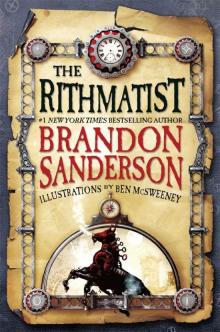 The Rithmatist
The Rithmatist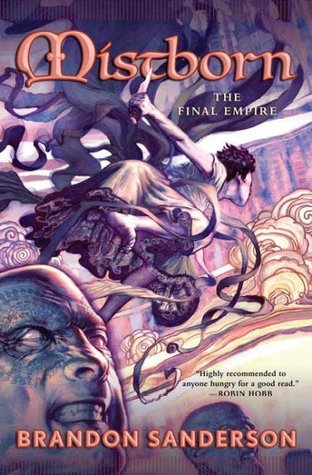 Mistborn: The Final Empire
Mistborn: The Final Empire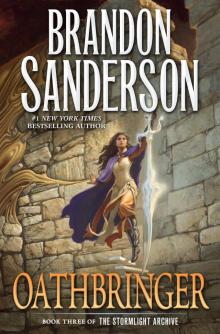 Oathbringer
Oathbringer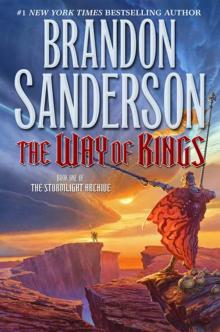 The Way of Kings
The Way of Kings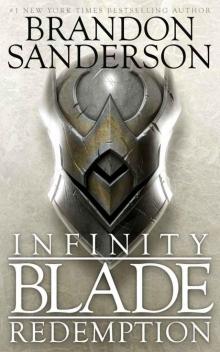 Redemption
Redemption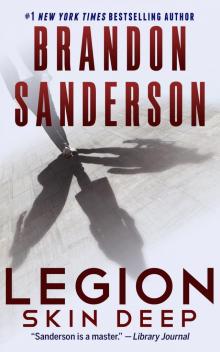 Skin Deep
Skin Deep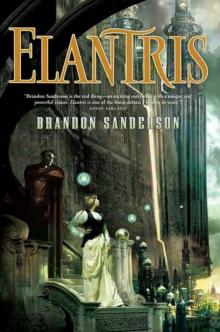 Elantris
Elantris Snapshot
Snapshot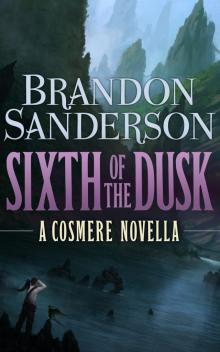 Sixth of the Dusk (Cosmere)
Sixth of the Dusk (Cosmere)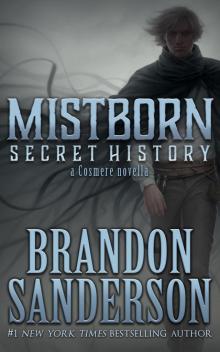 Mistborn: Secret History
Mistborn: Secret History White Sand, Volume 1
White Sand, Volume 1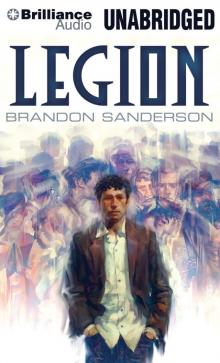 Legion
Legion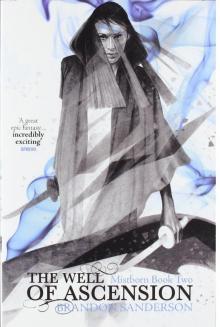 The Well of Ascension
The Well of Ascension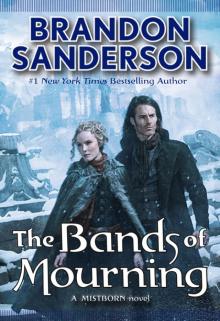 The Bands of Mourning
The Bands of Mourning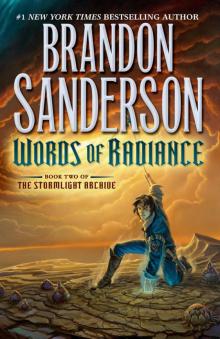 Words of Radiance
Words of Radiance The Hero of Ages
The Hero of Ages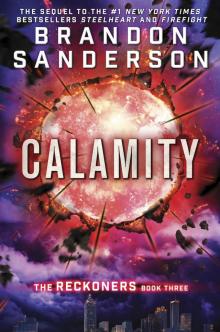 Calamity
Calamity Alcatraz Versus the Scrivener's Bones
Alcatraz Versus the Scrivener's Bones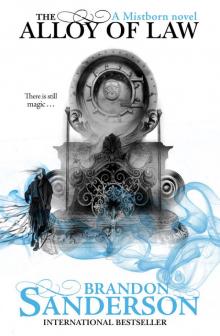 The Alloy of Law
The Alloy of Law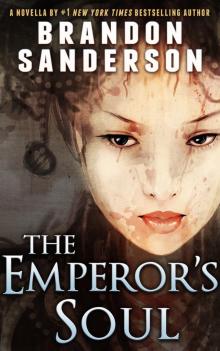 The Emperors Soul
The Emperors Soul The Dark Talent
The Dark Talent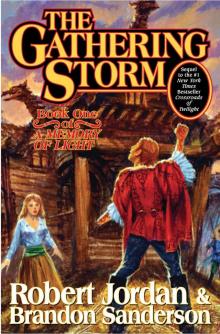 The Gathering Storm
The Gathering Storm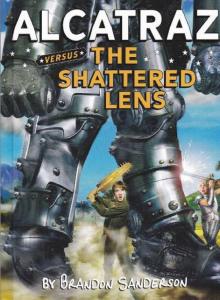 Alcatraz Versus the Shattered Lens
Alcatraz Versus the Shattered Lens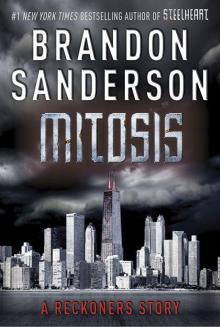 Mitosis
Mitosis Alcatraz vs. The Evil Librarians
Alcatraz vs. The Evil Librarians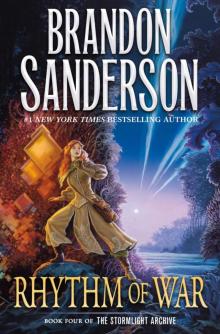 Rhythm of War (9781429952040)
Rhythm of War (9781429952040)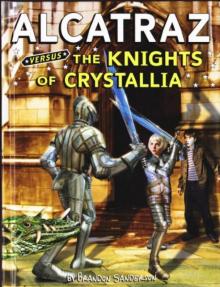 Alcatraz Versus the Knights of Crystallia
Alcatraz Versus the Knights of Crystallia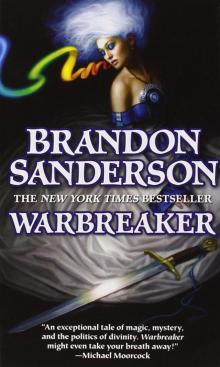 Warbreaker
Warbreaker Firstborn
Firstborn Starsight
Starsight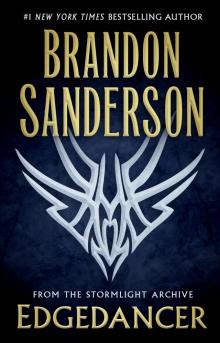 Edgedancer
Edgedancer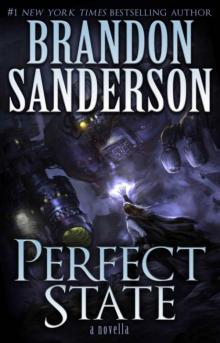 Perfect State
Perfect State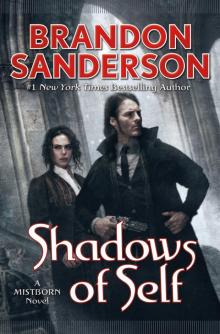 Shadows of Self
Shadows of Self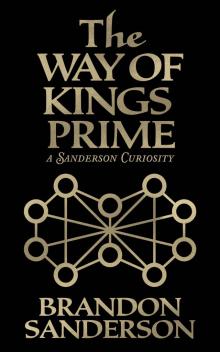 The Way of Kings Prime
The Way of Kings Prime Starsight (US)
Starsight (US)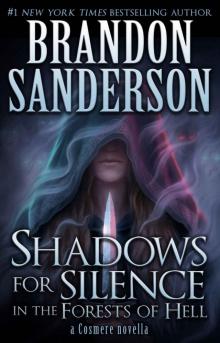 Shadows for Silence in the Forests of Hell
Shadows for Silence in the Forests of Hell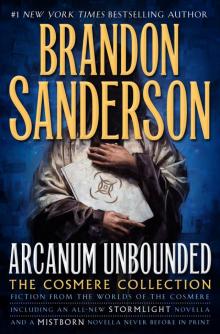 Arcanum Unbounded: The Cosmere Collection
Arcanum Unbounded: The Cosmere Collection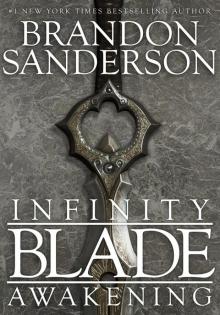 Awakening
Awakening Firefight
Firefight Dawnshard
Dawnshard Defending Elysium
Defending Elysium White Sand
White Sand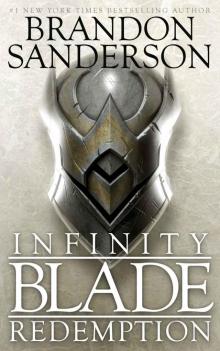 Infinity Blade: Redemption
Infinity Blade: Redemption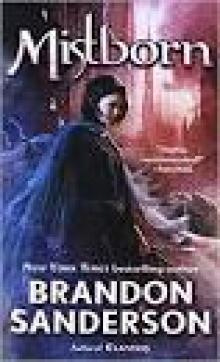 The Final Empire
The Final Empire Skyward
Skyward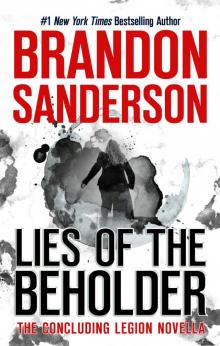 Lies of the Beholder
Lies of the Beholder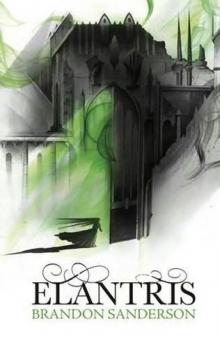 Elantris e-1
Elantris e-1 Steelheart r-1
Steelheart r-1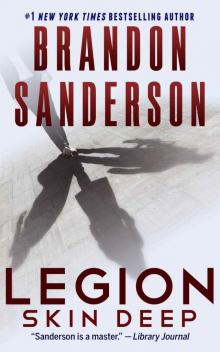 Legion: Skin Deep
Legion: Skin Deep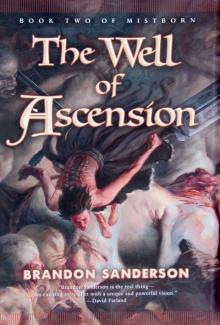 Well of Ascension
Well of Ascension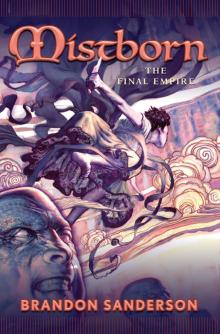 Mistborn
Mistborn Alcatraz versus the Evil Librarians
Alcatraz versus the Evil Librarians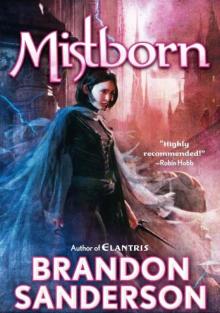 The Final Empire m-1
The Final Empire m-1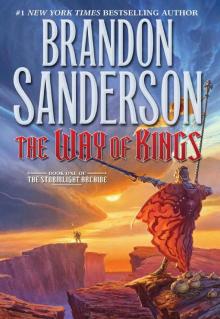 The Way of Kings (Stormlight Archive, The)
The Way of Kings (Stormlight Archive, The)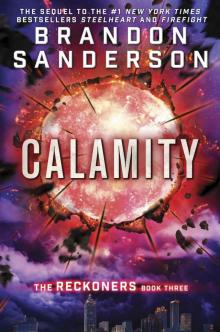 Calamity (The Reckoners)
Calamity (The Reckoners)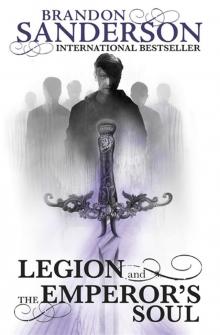 Legion and the Emperor's Soul
Legion and the Emperor's Soul Legion: The Many Lives of Stephen Leeds
Legion: The Many Lives of Stephen Leeds The Mistborn Trilogy
The Mistborn Trilogy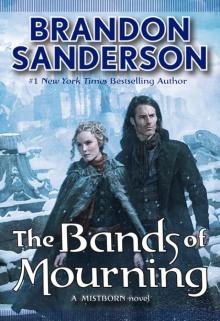 Bands of Mourning
Bands of Mourning Alcatraz
Alcatraz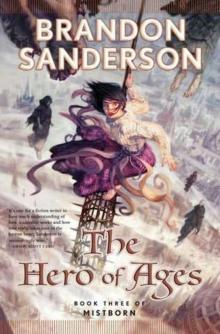 The Hero of Ages m-3
The Hero of Ages m-3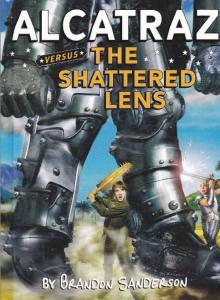 Alcatraz vs. the Shattered Lens
Alcatraz vs. the Shattered Lens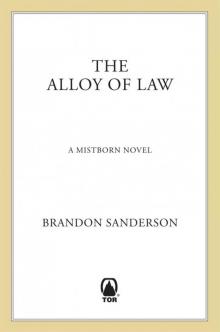 The Alloy of Law: A Mistborn Novel
The Alloy of Law: A Mistborn Novel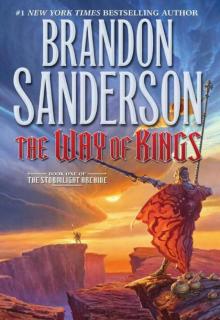 The Way of Kings sa-1
The Way of Kings sa-1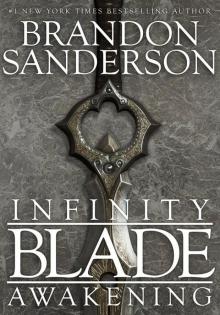 Infinity Blade: Awakening
Infinity Blade: Awakening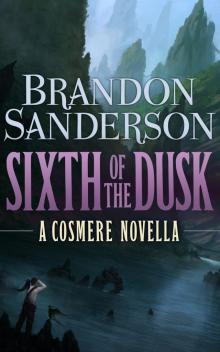 Sixth of the Dusk
Sixth of the Dusk The Stormlight Archive
The Stormlight Archive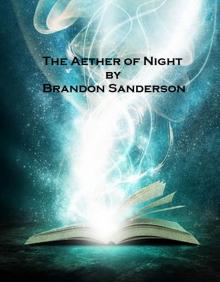 The Aether of Night
The Aether of Night